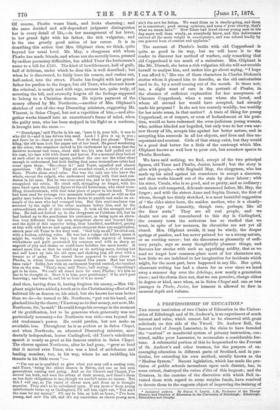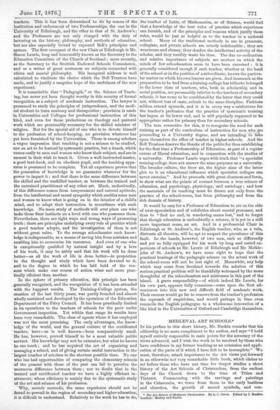A PROFESSORSHIP OF EDUCATION.* THE recent institution of two Chairs
of Education in the Univer- sities of Edinburgh and of St. Andrew's, is an experiment of much interest and value, which cannot fail to be observed with great solicitude on this side of the Tweed. Dr. Andrew Bell, the famous rival of Joseph Lancaster, in the claim to have founded the "mutual" or monitorial system of primary instruction, con- trived, unlike poor Lancaster, to accumulate a considerable for- tune. A substantial portion of this he bequeathed to the Provost of St. Andrew's and other trustees, for the purpose of en- couraging education in different parts of Scotland, and in par- ticular, for extending his own method, usually known as the "Madras System." Recent legislation, which has made the pro- vision of public schools incumbent upon each district, has, to some extent, destroyed the raison d'etre of this bequest ; and the Trustees, in the exercise of the discretion with which Bell in- vested them with regard to some surplus funds, have resolved to devote them to the cognate object of improving the training of
• Inaugural Address. By Simon S. Laurie, A.hL, Professor of the Theory History, and Practice of Education in the University of Edinburgh. Edinburgh: Edmonston and Douglas.
teachers. This it has been determined to do by means of the institution and endowment of two Professorships, the one in the University of Edinburgh, and the other in that of St. Andrew's ; and the Professors are not only charged with the duty of lecturing on the history, philosophy, and methods of education, but are also especially bound to expound Bell's principles and system. The first occupant of the new Chair at Edinburgh is Mr. Simon Laurie, long and honourably known as the Secretary to the Education Committee of the Church of Scotland ; more recently, as the Secretary to the Scottish Endowed Schools Commission, and as a writer of great acuteness on subjects connected with ethics and mental philosophy. His inaugural address is well calculated to vindicate the choice which the Bell Trustees have made, and to justify a sanguine hope of the usefulness of the new experiment.
It is remarkable that " Piidagogik," or the Science of Teach- ing, has never yet been thought worthy in this country of formal recognition as a subject of academic instruction. The lawyer is presumed to study the principles of jurisprudence, and the medi- cal student to learn anatomy and therapeutics ; provision is made in Universities and Colleges for professional instruction of this kind, and even for those prelections on theology and pastoral work which are presumably necessary for the skilled minister of religion. But for the special aid of one who is to devote himself to the profession of school-keeping, no provision whatever has yet been furnished by the Universities. There is among scholars a vague impression that teaching is not a science to be studied, nor an art to be learned by systematic practice, but a knack, which comes easily to men and women who know their subject, and are in earnest in their wish to teach it. Given a well-instructed master, a good text-book, and an obedient pupil, and the teaching appa- ratus is presumed to be complete. Yet all experience proves that the possession of knowledge is no guarantee whatever for the power to impart it ; and that there is the same difference between the skilled and the unskilled teacher, as between the trained and the untrained practitioner of any other art. Much, undoubtedly, of this difference comes from temperament and natural aptitude, from the intellectual and moral sympathy which enables some men and women to know what is going on in the interior of a child's mind, and to adapt their instruction in accordance with such knowledge. No mere study of methods will ever place one who lacks these finer instincts on a level with one who possesses them. Nevertheless, there are right ways and wrong ways of presenting truth ; there are principles underlying every rule of practice which a good teacher adopts, and the investigation of them is not without great value. To the average schoolmaster such know- ledge is indispensable, as a means of saving him from mistakes and enabling him to economise his resources. And even of one who is exceptionally qualified by natural insight and by a love of his work, it may be safely said that his work will be done better—as all the work of life is done better—in proportion to the thought and study which have been devoted to it, and to the degree in which he has laid hold of the rea- sons which make one course of action wiser and more prac- tically efficient than another.
In the sphere of primary education, this principle has been generally recognised, and the recognition of it has been attended with the happiest results. The Training-College system, the creation of the last thirty years, was partly founded and almost wholly sustained and developed by the operation of the Education Department of the Privy Council. It has been practically limited in its operations to the teachers of schools for the poor under Government inspection. Yet within that range its results have been very remarkable. The class of agents whom it has employed was not the most promising. The early advantages, the know- ledge of the world, and the general culture of the certificated teacher, have—as is well known—been comparatively small. He has, however, proved himself to be a most valuable public servant. His knowledge may not be extensive, but what he knows he can teach ; and he has acquired the art of organising and managing a school, and of giving certain useful instruction to the largest number of scholars in the shortest possible time. No one who has had opportunities of comparing the elementary schools of the present with those of the past can fail to perceive the enormous difference between them ; nor to doubt that in the trained and certificated teacher we have a highly efficient in- strument, whose efficiency is mainly due to the systematic study of the art and science of his profession.
Why, mutatis mutandis, the same experience should not be found to prevail in the region of secondary and higher education, it is difficult to understand. Relatively to the work he has to do, the teacher of Latin, of Mathematics, or of Science, would find I that a knowledge of the best rules of practice which experience I can furnish, and of the principles and reasons which justify these rules, would be just as helpful as to the teacher in a national school. Many of the traditional methods in use in grammar, collegiate, and private schools are utterly indefensible ; they are wearisome and clumsy, they deaden the intellectual activity of the scholar, and they terribly waste his time. The due co-ordination and relative importance of subjects are matters on which the minds of few schoolmasters seem to have been exercised ; it is generally considered enough if each teacher, whether at the head of the school or in the position of a subordinate, knows the particu- lar matter on which his own lessons are given. And inasmuch as the preparation to be had from a training-college has hitherto belonged to the lower class of teachers, who, both in scholarship and in social position, are presumably inferior to the teachers of secondary schools, it has come to be considered by the latter that they could not, without loss of caste, submit to the same discipline. Fashiona seldom extend upwards, and it is in every way a misfortune for the teacher's profession that the practice of systematic training has begun at its lower end, and is still popularly supposed to be appropriate rather for primary than for secondary schools.
The true corrective for this, is to recognise the need for such training as part of the curriculum of instruction for men who are proceeding to a University degree, and are intending to take upon themselves the office of teacher in higher schools. And the Bell Trustees deserve the thanks of the public for thus establishing for the first time a Professorship of Education, as part of a regular course of liberal education, and in connection with the studies of a university. Professor Laurie urges with truth that "a specialist training college does not answer the same purposes as a university. The broader culture, the freer air, the higher aims of the latter give to it an educational influence which specialist colleges can never exercise." And he proceeds, with great clearness and force, to show what are the points of contact between a true science of education, and psychology, physiology, and sociology ; and how the materials of its teaching must be drawn not only from the practice of the school-room, but from philosophy and from the rich domain of history.
It would be easy for a Professor of Education to err on the side of over-speculation and of subtleties about mental processes, and thus to "find no end, in wandering mazes lost," and to forget that though education is undoubtedly a science, it is yet in a still more important sense, an art. And in a professorial Chair in Edinburgh or St. Andrew's, the English teacher, who, as a rule, distrusts all theories, will be apt to suspect the prevalence of this fault. In the hands, however, of two men, each so differently and yet so fully equipped for his work by long and varied ex- perience of schools as Mr. Laurie of Edinburgh and Mr. Meikle john of St. Andrew's, we have some right to hope that the practical bearings of the pedagogic science on the actual work of the school-room will not be lost sight of. Meanwhile, any help which may come from Scotland towards the solution of this serious practical problem will be thankfully welcomed by the more thoughtful of the schoolmasters and mistresses in this part of the island. A grave responsibility—of which indeed Mr. Laurie, for his own part, appears fully conscious—rests upon the first ad- venturers into this new and difficult field of academic work. Their success would go far to remove from the teacher's profession the reproach of empiricism, and would perhaps in time even reconcile the English pedagogue to a wholesome innovation of a like kind in the Universities of Oxford and Cambridge themselves.



































 Previous page
Previous page